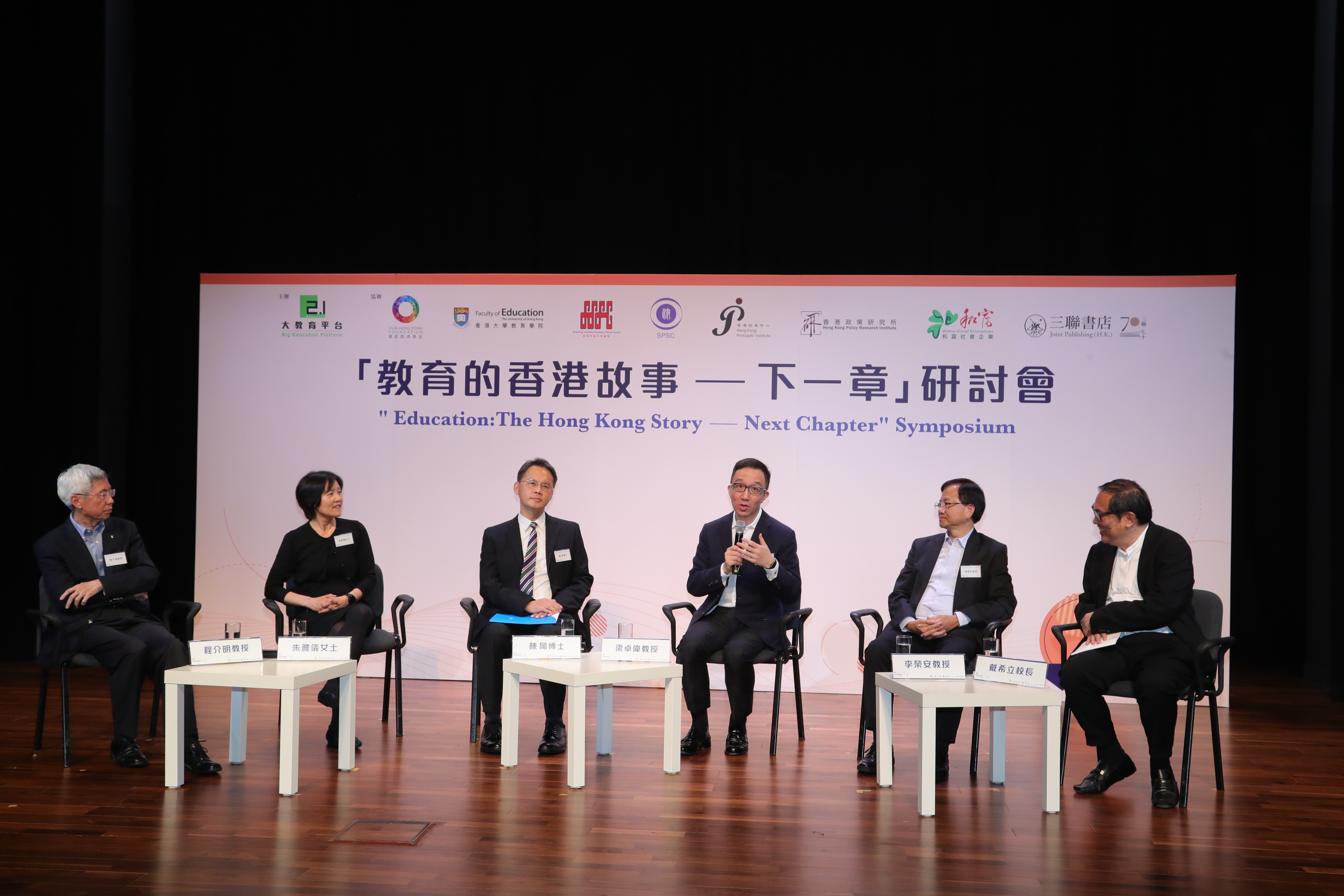
Education 2.1 and Big Education Platform, together with Hong Kong Policy Research Institute, Our Hong Kong Foundation, Faculty of Education of the University of Hong Kong (HKU), Hong Kong Subsidized Secondary Schools Council, Hong Kong Subsidized Primary Schools Council, Hong Kong Principal's Institute, Wofoo Social Enterprises and Joint Publishing (Hong Kong) Company Limited, co-organised the "Education: The Hong Kong Story -- Next Chapter" Symposium (the Symposium) at HKU today (October 20) to discuss the education policy reform over the past 20 years and future development.
Education 2.1 proposes the government, University Grants Committee (UGC) and all universities to reform the current university admissions system to take into consideration students' various abilities and learning experience, and to use a more flexible, diversified and innovative approach in admissions. The group is of the view that examination results should no longer be the major criterion for university admissions.
The Chief Executive of the Hong Kong Special Administrative Region Mrs Carrie Lam officiated at the Symposium. Around 300 primary and secondary school principals, members of the education and other professional sectors attended the Symposium for in-depth discussions and to exchange views on the review of the education reform and future development direction.
Mr Antony Leung Kam Chung, Chairman of Education 2.1 and Big Education Platform, said since the publication of the first education target consultation document - "Education Blueprint for the 21st Century Review of Education System: Reform Proposals" in 1998, a comprehensive review of the education system in Hong Kong was carried out and various reforms took place in the past 20 years. The education reform in Hong Kong had achieved positive results which were cited and commended in some internationally renowned research papers. However, due to rapid changes in society, it is time to review and envisage a new direction of future education development to prepare our new generation for the challenges in the new era.
Mr Leung is delighted that the government has actively and positively responded to the demands of the education sector. The Chief Executive Mrs Carrie Lam has allocated more resources to education since assuming office. In her newly delivered Policy Address, the recurrent expenditure on education will be greatly increased. Education 2.1 and the education sector welcome a series of constructive measures to be carried out by the government such as implementation of the all-graduate teaching force policy in public sector primary and secondary schools in one go, strengthening of school-based management to reduce the administrative work of teachers, enhancement of teachers' professional development, and advocacy of experiential learning and STEM education.
In the 21st century, students not only need a specific and broad "T-shaped knowledge", but also a comprehensive approach to literacy and positive values so as to cope with challenges. The current university admissions system emphasises the importance of DSE results, while ignoring other learning experiences and specialties of students. This overemphasis on examination results in admissions has had a negative impact on the learning environment and experience in secondary and primary schools. Teaching and learning in schools are unable to cater for students' diversified needs.
Education 2.1 believes it is time to review the university admissions system, with an aim to break the barrier caused by the exam-oriented culture to create a broader learning environment which can enrich students' learning experience and broaden their self-learning horizon. Education 2.1 also suggests universities to take into consideration Student Learning Portfolios (SLPs) and principals' recommendation letters in admissions. In addition, UGC and tertiary institutions should place less emphasis on admission results in institutions' performance evaluation, so as to reduce the pressure on them. Education 2.1 also proposes to broaden the pathway to tertiary education so that students who cannot gain admission to universities can still pursue further studies.
"The world is changing fast and its development has become more diversified. New knowledge evolves rapidly. Students should diversify their interests and abilities. The traditional examination model can no longer reflect students' actual abilities. Only by changing the admission system to allow more flexibility for universities to choose their students, and by promoting students' self-learning initiative in secondary schools and broadening their further studies options, can a holistic education be achieved effectively," said Mr Leung.
In addition, Education 2.1 and Joint Publishing (Hong Kong) Company Limited have jointly launched a new book "Analysis of Hong Kong's Education Reform and Development 1997-2017", which covers the initiatives and research results by Education 2.1, with articles written by people involved in the education reform and policy implementation such as government officials, professors and frontline educators, and international renowned scholars, over a wide variety of topics including public consultation details and government policies, different levels of education, from the perspective of students and teachers. It reviews the development and problems of Hong Kong's education system in the past 20 years, and envisages new directions for development. Authors include Antony Leung Kam Chung, Cheng Kai Ming, Li Yuet Ting, Fanny Law, Catherine Chan Ka Ki, Maria Lam Woon Sum, Cheung Man Kwong, Marc Tucker, Anthony Mackay, Lee Wing On, Richard Wong Yue Chim, Wong Yuk Shan, Tsoi Kai Lok, Tai Hay Lap, Law Chi Kwong, Ho King On and Hong Kong Policy Research Institute.










